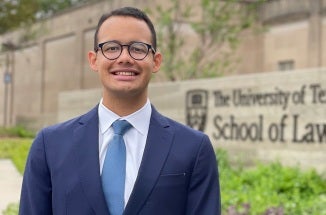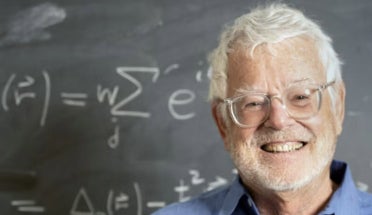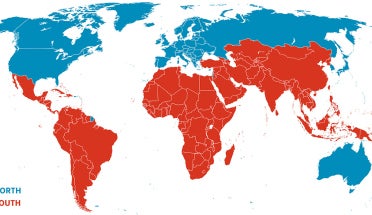
Law School Prepares International Graduate for Promising Career
- Oct 3, 2022
- Global Alumni Relations
- Carly Toepke, School of Law
Alumnus Rafael Jerez Moreno (LL.M. ’22, Latin American and international law) is a 2021-2022 MD Anderson Research Fellow and Fulbright scholar from Honduras who specializes in electoral justice, anti-corruption and citizen outreach efforts. In this July 2022 interview with Carly Toepke, assistant director of graduate and international programs at The University of Texas School of Law, Moreno discussed the path he’s forging toward his goal of one day becoming the president of Honduras.
What is your academic and professional background?
I am a Honduran lawyer, graduated from the National Autonomous University of Honduras. I have focused my career in areas of law like electoral, constitutional, human rights and international affairs.
Until now, I invested a major part of my professional career in the Association for a More Just Society, the Transparency International chapter in Honduras—where I contributed to the Honduran electoral system reform—as well as anti-corruption efforts in public procurement processes and motivating citizen participation in political affairs.
Additionally, I am a member of the Latin American Observatory of Political Reforms, where I have participated as a researcher of the Honduran electoral system´s evolution.
In 2021 I was granted a Fulbright Scholarship by the United States Government to pursue a Master of Laws (LL.M.) degree in Latin American and international law at the University of Texas School of Law.
Since the beginning of my career, I was fortunate enough to have mentors who allowed me to deepen my passion for legal and political research, enabling me to participate in the publication of articles and books addressing human rights and democratic governance in Honduras and Central America.
How did your studies at Texas Law impact you? How could they impact your global presence?
As a person coming from a different country, the Texas Law community was very welcoming. For instance, faculty members understood where we (LL.M. students) were coming from, in terms of adapting to a new background, and made everything seem familiar. Even though the Master of Laws program targets international students, I had the opportunity to interact with U.S. law students—for example, in the Student Bar Association Board of Governors, from whom I understood the diversity of ways they envisioned their country, their role within it, and their interest to learn from our countries, too.
Academically, my studies enabled me to deepen my passion for constitutionalism. UT opened a wider door; it submerged me into the comparative constitutionalism world. As a person who is passionate about politics, understanding the basis upon which different political systems are built helps me to have a clearer vision of the world and the evolution of societies.
Above all, sharing the journey with my LL.M. classmates was the most enriching part of it, learning from their specialties and their humanity. The sum of everything I just mentioned is what could help me make an impact that transcends the borders of my country, knowing that my responsibility is to contribute to the democratization of Honduras as part of the broader development of the region.
Has the LL.M. degree in Latin American and international law opened doors and opportunities for you?
Yes! Just when I was finishing the LL.M. program, I applied to two programs: the International Academic Program (IAP) organized by the Autonomous University of Madrid in collaboration with the Latin American Rockefeller Center of Harvard University and the 2022 Iberoamerican Youth Leaders (IYL) program sponsored by the Carolina Foundation and the Santander Bank in Spain.
The IAP program was a door that opened after I’d participated in another program with the Botin Foundation of Spain in 2018. Living the experience just two weeks after I finished my LL.M. program at UT helped me to participate actively during the sessions, especially in those that involved politics, with a clear understanding of the U.S. constitutional basics, as well as the Socratic method professors used.
On the other hand, the IYL program selected 25 youth leaders from Latin America, Spain and Portugal for a two-week experience (celebrated June 25-July 9) to interact with political leaders and institutions in Spain and in the European Union and learn from their collective role in the fulfillment of the 2030 Agenda for Sustainable Development. Both opportunities were great scenarios where I shared with colleagues my experience at UT as a Fulbright Scholar.
Now that I am back home, I’m continuing to work on research projects related to constitutional and electoral matters with the Center for Democratic Studies in Honduras and the International Foundation of Electoral Systems. In August, I will start a new job as part of the Honduran Council of Private Enterprise, handling projects on political and legal matters in collaboration with international organizations based in the country.
With the motto, What starts here changes the world: How do you think your degree from UT Law will help you do that?
It will help me change the world because as I continue my academic and political journey, I always have in my mind the vast community of friends and colleagues I have all around the world, thanks to my experience in The University of Texas School of Law, from whom I will continue learning as I see them grow in their respective adventures.
As one of my mentors told me once, research necessarily needs to have a social impact. [My studies at] UT strengthened my abilities to expand my analytic capabilities and to build solutions and try to put them into practice during my political career, with lessons learned in other legal and political systems.
I can assure you: UT has a Longhorn in Honduras who will fight to make the School of Law proud!



